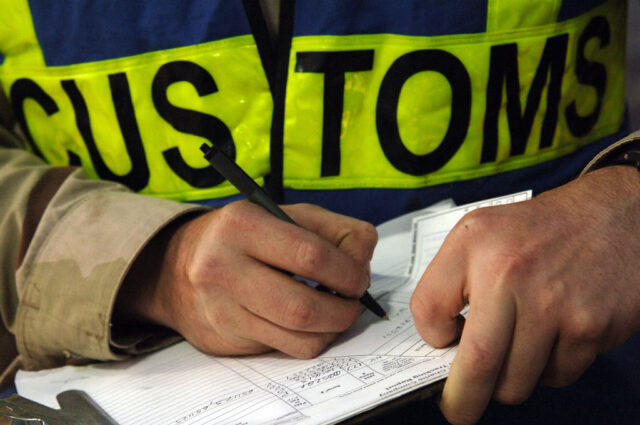
Having your money seized by Customs can be a distressing situation and can quickly suck the joy out of traveling. Going through Customs, terminals, and security checks is already enough of an inconvenience, and unexpectedly having cash confiscated only makes matters much worse.
Unfortunately, there isn’t a legal limit to how much money you can bring, in cash, through the airport. Just keep in mind that whenever you’re traveling internationally, you’ll need to declare any sums greater than $10,000. To provide this notice, you will need to fill out a FinCEN 105 form at Customs.
In addition, if a law enforcement officer ever questions you about a large amount of cash you’re carrying, you will need to provide them with a legitimate explanation. If you cannot provide a satisfactory explanation, you are at risk of your cash being confiscated—even if it was legally obtained.

Whenever you cannot explain why you’re traveling with large amounts of cash, a TSA agent will likely file a report to one of the available law enforcement agencies, such as the Drug Enforcement Agency (DEA).
This leads to a complicated and often quite drawn-out situation and can even result in missing your flight. Overall, it’s a frustrating (and sometimes humiliating) position in which to find yourself.
The first and most important step to tackling this situation? Make sure to hire an attorney with extensive experience in cash seizures at Customs. That’s why you can always turn to the services of customsesq.com.
How To Get Your Money Back After An Airport Seizure?

If you’ve had your money confiscated at an airport, whether you’re guilty of any wrongdoing or not, there are a few actions you should take. But, again, most importantly, you will first need to hire an experienced asset forfeiture and seizure attorney—otherwise, there is a very slim chance that you will be able to retrieve your funds.
To start, in the airport, there are three different types of cash seizures. These are:
- Airport seizure
- Drug Enforcement Agency (DEA) seizure
- United States Customs Border seizure
The route you take is largely dependent upon the entity that performed the search and seizure. A variety of agencies can perform such actions. For instance, an airport seizure could be performed by local police; alternatively, it could be performed by the Federal Bureau of Investigation (FBI). State authorities could even perform the seizure.
Much of the time, however, seizures of cash at the airport are done by federal authorities.
After you’ve had your cash seized, there is a seven-step process to having your money returned to you. These steps are:
Receive A Notice Of Forfeiture In The Mail

If federal authorities confiscated your money, you will receive a notice of forfeiture through the mail. Typically, this will take at least a few days to arrive. Due to forfeiture law, you won’t be able to submit a civil suit against the federal government if you’re looking to recover your money.
Additionally, the notice will inform you that you may file a petition for mitigation or remission—still, this generally isn’t a wise idea if you’re looking to have your funds returned.
The seizing agency will come to the final decision, and if they decide against returning your money, you won’t be able to appeal that outcome. More often than not, this won’t be worth the risk, and an attorney will advise against it. In general, be wary about the legal advice provided by this notice.
A good deal of this advice can be misleading—try not to take it at face value. Misleading information can relate to the burden of proof, requiring an explanation for committing a crime, or the documentation that you will need to provide. For example, never admit that you were traveling with the confiscated money illegally—this kind of admission will typically result in authorities refusing to return your money. It could even lead to prosecution for a crime.
Wait To See If There Is An Unreasonable Delay

Even if you feel panicked by the situation, try waiting patiently for the federal government to launch the forfeiture process. If this process isn’t started within a reasonable time, you are allowed to take action.
For instance, your attorney might opt to mount an Unreasonable Delay defense; this can allow legal proceedings to be expedited. Then, it’s up to the agency in question to determine whether a law was broken. If no laws were broken, then you could have your funds returned to you.
Engage In Mail Correspondence
Sometimes, there will be a slight delay before court proceedings begin. If this delay occurs, avoid speaking directly with the agency—if you do this, they may ask you additional questions about the seizure.
Your answers to these questions could be used in discovery. Instead, try to restrict all your correspondence to mail. You should also keep copies of all these letters so that your attorney can use them in a motion to have charges dismissed.
File An Administrative Claim
After receiving the notice of forfeiture, you’ll be given 35 days to file an administrative claim. This legal document will include an argument, statutes, regulations, and judicial interpretations of any relevant laws. It could also draw attention to the parameters of Customs’ published remission and mitigation procedures regarding failure to report large sums of money.
Post A Cost Bond
If necessary, make sure to post a cost bond when you are told to do so. This surety bond will act as a promise to cover court expenses; generally, this will be around 10% of the seized funds.
The U.S. Attorney Reviews Your Case

At this point, the U.S. attorney will take a closer look at your case; if they then decide to keep the seizure in place, a civil suit will be filed in the U.S. District Court. A complaint will be sent to inform you of this.
File A Verified Claim
Finally, you will need to file a verified claim within 30 days; you’ll have another 20 days to submit your response. In the response, your attorney will list any defenses that they intend to employ in court. Remember that, in this response, you are entitled to request a trial by jury.
Bottom Line
Hiring an expert in such laws, before the seizure of the merchandise can save the client much time and a considerable amount of expenses. If your business is going through a similar issue, contact professionals during the detention phase, preferably before the seizure notice is issued!









